Uncovering the Power of a 100-Watt Solar Panel: What Will It Run?
Are you trying to figure out what a 100-watt solar panel can power? So, let’s get started!
This blog post will explore the power of a 100-watt solar panel and what it can run.
We will cover topics such as how much power a 100-watt solar power system can produce, what is possible to power with a 100-watt solar panel, how to use a 100-watt solar panel, and what to consider before purchasing a solar kit.
Plus, we will look at choosing the suitable solar charge controller and what you need to know about using a solar system on a cloudy day.
Provo Green Products is your reliable source for discovering sustainable products that positively impact your life and the environment.
With extensive experience in manufacturing, trades, and construction, Provo Green Products thoroughly researches each product before providing accurate and up-to-date information on its sustainability.
You can trust that you’re getting trustworthy insights to make informed choices whether you’re looking for solar products, electric bikes, eco-friendly products, renewable energy solutions, etc.
Provo Green Products is your go-to destination for finding the right green products for your lifestyle.
Disclosure: As an Amazon Associate, I earn from qualifying purchases. This does not affect the product pricing whatsoever.
Introduction to Solar Power
Solar Power is one of the most reliable and efficient sources of energy available today.
It is also renewable, meaning you can generate power from the sun’s energy without relying on other power sources.
Solar power is becoming increasingly popular in residential and commercial settings, as it is a clean and cost-effective way to generate electricity.
Solar panels can generate electricity for various applications, ranging from powering lights and appliances to providing energy for heating and cooling systems.
A 100-watt solar panel is an excellent way to get started with solar energy, as it is affordable and easy to install.
When it comes to solar panels, size matters, smaller solar panels, such as a 100-watt solar panel, are suitable for small-scale projects and are ideal for those looking to save money on their energy bills.
So, let’s look closer to see what a 100-watt solar energy system produces.
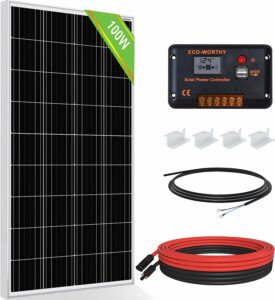
What Can a 100-Watt Solar Panel Produce?
It can produce up to 100 watts to power various small appliances and devices.
A 100-watt solar panel can power small items such as laptops, cell phones, and other small electronic devices.
It is also capable of powering small lighting systems and other low-power appliances.
A 100-watt solar panel’s power depends on the sunlight it receives.
It is recommended to place solar panels in areas that receive direct sunlight for at least 6 hours a day.
It is also essential to ensure the solar panel is not shaded by trees or other structures, as this can significantly reduce the amount of power it can produce.
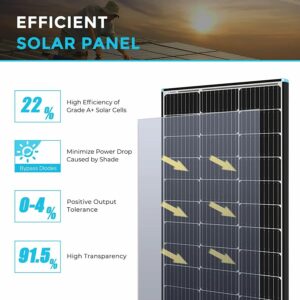
How Much Power Does a 100-Watt Solar Panel Produce?
The amount of power a 100-watt solar panel can produce depends on the sunlight it receives.
Generally, a 100-watt solar panel can generate up to 100 watts in ideal conditions.
However, this amount will vary depending on the hours of sunlight the panel receives and the panel’s angle to the sun.
A 100-watt panel can generate up to 1000Wh of energy in ideal conditions; a 100-watt panel can generate up to 1000Wh daily.
This is enough to power a variety of small appliances and devices.
However, this amount can vary depending on the amount of sunlight the panel receives and the panel’s angle in relation to the sun.
What Will a 100-Watt Solar Panel Run?
A 100-watt solar panel can run a variety of small appliances and devices. It can provide the following:
- Enough power to run a Laptop.
- Cell Phone.
- Light Bulbs.
- Ceiling Fan.
- Coffee Maker.
- Other small devices.
With the correct setup, it can also be used to power a small RV or boat, though it is important to note that the amount of power generated will depend on the amount of sunlight the panel receives.
In addition to powering small electronic devices, a 100-watt solar panel can charge batteries.
This is especially useful for those using solar power to charge batteries for camping, emergency preparedness, or other off-grid applications.
With the correct setup, a 100-watt solar panel can generate enough power to charge a 12V battery in a few hours.
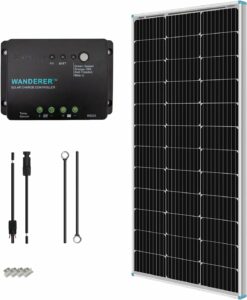
How to Use a 100-Watt Solar Panel
Using a 100-watt solar panel is relatively easy.
First, you must mount the panel in an area that receives direct sunlight for at least 6 hours daily.
It is also essential to ensure that trees or other structures do not shade the panel, as this can significantly reduce the amount of power it can generate.
Once the panel is mounted, could you connect it to an inverter and battery?
The inverter will convert the power from the solar panel into usable electricity.
The battery will store the energy for later use.
Finally, you must connect the inverter and battery to the devices or appliances you wish to power.
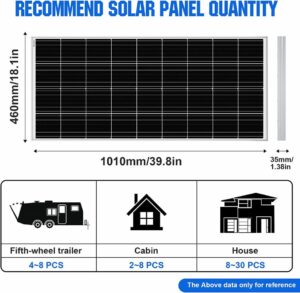
What to Consider Before Purchasing a Solar Panel Kit
If you are looking to purchase a solar panel kit, there are a few things that you should consider.
First, you will need to determine what size panel you require, as this will determine the amount of power that can be generated.
Also, you’ll need to consider the number of panels you need to generate the energy required.
You’ll also want to consider the type of battery required because this will determine how much power the panel can store.
Finally, you will need to consider the type of charge controller to ensure that the power generated by the panels is used efficiently.
How to Choose the Right Solar Charge Controller
A solar charge controller is an essential component of any solar panel system.
It regulates the flow of electricity from the solar panel into the battery.
You should consider some factors when choosing a suitable solar charge controller.
First, you must consider the type of solar panel you have.
Different charge controllers are designed to work with different types of solar panels.
Also, you will need to consider the type of battery that you are using because this will determine the type of charge controller that works best for your system.
Finally, you will need to consider the amount of power you will generate.
This will determine the size of the charge controller that you need.
Choosing a suitable charge controller ensures your solar panel system runs efficiently.
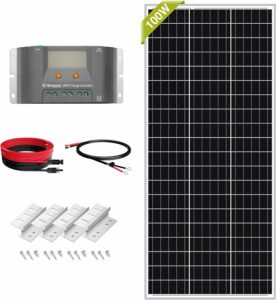
What You Need to Know About Using Solar Power on a Cloudy Day
Using solar power on a cloudy day can be tricky, as the amount of energy generated from a solar panel depends on the amount of sunlight it receives.
If clouds block the sunlight, the amount of power that can be generated will significantly reduce.
However, there are a few steps that you can take to ensure that your solar panel system is still running efficiently.
First, you should make sure that the solar panel is tilted at the right angle to the sun.
This will ensure that the solar panel receives as much sunlight as possible.
Also, please make sure that trees or other structures do not shade the solar panel, as this can further reduce the amount of power it can generate.
Finally, investing in a solar charge controller designed to work with low-light conditions would be a good idea.
This type of charge controller is designed to maximize the amount of power generated from a solar panel, even in cloudy conditions.
Conclusion
Solar power is increasingly popular as it is a clean and cost-effective way to generate electricity.
A 100-watt solar panel is an excellent way to get started with solar energy, as it is affordable and easy to install.
It can generate up to 100 watts of power in ideal conditions, enough to power various small appliances and devices.
In addition to powering small electronic devices, a 100-watt solar panel can charge batteries.
It can also be used to power a small RV or boat, though the amount of power generated will depend on the amount of sunlight the panel receives.
Stay in Touch!
I’am a dedicated entrepreneur with many years of experience and an integrity-driven individual who is highly motivated to succeed. Leveraging extensive expertise in manufacturing, construction, and various trades, we can provide a solid foundation for sustainable living. Our meticulous research process guarantees that our information about each product is precise and current, allowing you to make informed decisions. A deep understanding of business operations empowers me to consistently implement improvements that result in ongoing success. Visit site.
